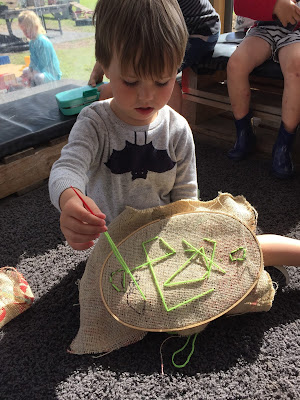“By exposing children to creative experiences, we give them the gift of a rich and memorable childhood while laying the foundation for a lifetime of creative expression – all topped off with a heaping helping of important learning skills” (Kohl, 2008).
The tamariki were invited to engage and contribute to the experience over a period of time.
Through this observation and participation, the children had the opportunity to engage in a new experience that allowed their creative expression to grow and encouraged the development of numerous skills.
As they worked with the needle and thread, the tamariki developed their concentration and thinking skills, perseverance, hand-eye co-ordination and fine motor skills.
“Fine motor skills involve the small muscles of the hands that enable such functions as writing, grasping small objects, and fastening clothing. Fine motor skills involve strength, precision and dexterity. They affect learning and living skills” (Villeger).
“Creativity focuses on the process of forming original ideas through exploration and discovery. In children, creativity develops from their experiences with the process, rather than concern for the finished product” (Kohl, 2008).
Working together, learning in small groups helps the exchange of ideas and increases interest among the children while also promoting critical thinking (Gokhale, 1995). The language and conversation shared within the group as the tamariki worked demonstrated a deeper level of thinking and concentration as they processed and focussed on their goal and creative product.
As the children worked, with the needle and thread they developed and strengthened their finger muscles and small hand muscles, while also encouraging the use of the pincer grip between the thumb and forefinger. Important skills to develop both for now and into the future.
“Children learn through play and open-ended activities. It allows them the chance to explore the world around them, ask questions, and see how things work” (Thomas, 1997).
“Children who feel free to make mistakes and to explore and experiment will also feel free to invent, create, and find new ways to do things. Grant the lasting gift of freedom to children – to make mistakes and learning from doing. The side benefit is that fostering creativity…gives children a zest for imagining and learning to last a lifetime” (Kohl, 2008).














No comments:
Post a Comment